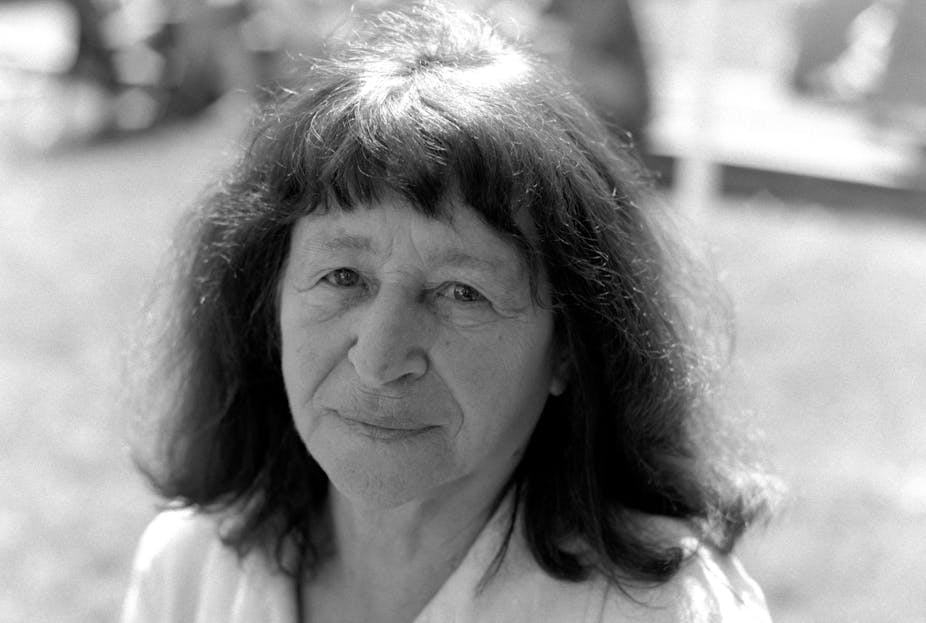One of the most captivating and enigmatic novelists of the 20th century, Bernice Rubens remains largely unknown despite her remarkable literary achievements. She was the second recipient of the Booker prize in 1970 for her novel The Elected Member and its first female winner.
She remains the only Welsh winner in the history of the prize – a fact that perhaps speaks volumes for the way Welsh writing in the English language is perceived and recognised outside of Wales.
Rubens was born in the working class area of Adamsdown in Cardiff in 1923, to Polish and Lithuanian Jewish immigrants. She attended the University College of South Wales and Monmouthshire, Cardiff (now Cardiff University), where she received a BA in English in 1947. Having taught English and worked on documentary films early on in her career, she only started writing at the age of 30.
Rubens went on to publish more than 20 novels and one work of non-fiction before her death in 2004, but still referred to her own writing as merely “better than most, not as good as some”.
This wry view underplays just how versatile her style and subject matter was, however. And while Rubens was well known and applauded during her lifetime, her work, like so many other Welsh women, is often unknown outside of Welsh university circles, some English literature degrees and more adventurous book clubs.
Some of this relates, perhaps, to the fact that she never really fitted into the Cardiff literary scene and was often overshadowed by some of her contemporaries, especially Welsh poet, Dannie Abse.
But as a working class Welsh-Jewish writer, her ability to unflinchingly explore the traumas and legacies of her own cultural heritage makes her writing especially memorable and haunting.
Cultural background
In The Elected Member, Rubens looks at how the façade of a respectable Jewish family crumbles when their beloved son plunges into the depths of drug addiction.
Her 1983 novel, Brothers, explores the experiences of four generations of a family as they face the Tsarist army in Russia in the 1830s, the 1871 Odessa pogrom in Ukraine, emigration (to both Wales and Germany) and concentration camps.
The novel exemplifies the worst of human behaviour in relation to marginalised and persecuted people. But it also underlines the need for human connection and, ultimately, hope. No one who reads Brothers could walk away from the experience unchanged.

From a Welsh perspective, her 1975 novel, I Sent A Letter to My Love, is one of Rubens’ most disturbing and strangely poignant works. Set in the “one-eyed” seaside town of Porthcawl, the novel follows the struggles of unmarried, middle-aged Amy and her disabled brother, Stan, and their close friend, Gwyneth, as they live out their tedious existences.
Much of the novel’s action revolves around the drama that ensues from Amy placing an advert in the personal column of the local newspaper under the pseudonym “Blodwyn Pugh”. Instead of receiving an overwhelming postbag of suitors, Amy receives a single reply –- from her brother, Stan.
Their letter writing becomes increasingly sexual, until Stan starts to develop feelings for Gwyneth. This willingness to confront the quasi-incestuous nature of the siblings’ relationship (albeit unknowing, at least on Stan’s side), is one of the reasons Rubens’ work is so discomfiting. It refuses to be easily labelled or contained in a genre or style.
The novel was later made into a French film, Chère Inconnue, in 1982, starring Simone Signoret and Jean Rochefort, which also plays on the novel’s disturbing central plot.
Defying genre
Overall, Rubens’ fictions are hybrid and sit between different cultural identities. They are impossible to neatly pigeonhole. Indeed, critics like Hana Sambrook have referred to the “maddening” refusal of her writing to fit neatly into a single category.
However, this refusal to fit is exactly why Rubens is so important. Why should she fit neatly into any category? Why do we put so much value on genre and style being so precisely categorised?
Readers today will find much of Rubens’ back catalogue available second hand. But only a single novel, I Sent A Letter to My Love, has been incorporated into the Library of Wales series from publisher Parthian Books, which aims to republish significant works of classic Welsh literature in English.
Rubens sits alongside a small handful of other women writers in the collection, including Rachel Trezise, Dorothy Edwards, Hilda Vaughan and Margiad Evans.
Perhaps the way we immortalise our own cultural history in Wales is part of the reason why working-class women writers such as Rubens are yet to reach a wider audience, beyond the popularity of their day.
However, even more importantly in my view, it lies with the failure of prominent prizes to fully recognise Welsh women’s contribution to literary history. Sadly, it’s a failure that seems unlikely to be overturned any time soon.

